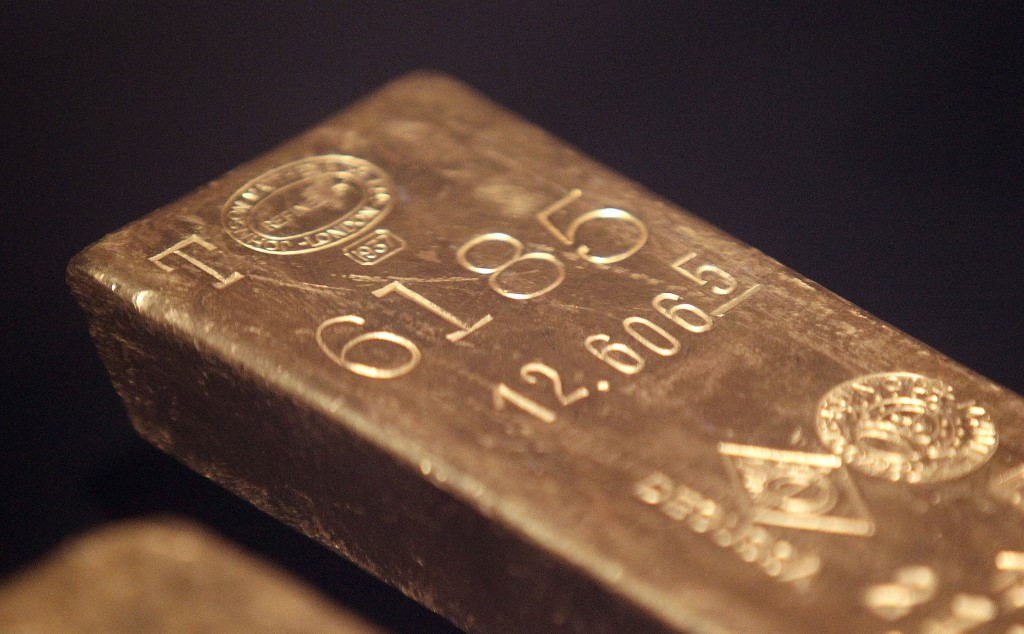Popular Reads
Top Results
Can't find what you're looking for?
View all search resultsPopular Reads
Top Results
Can't find what you're looking for?
View all search resultsGovt reaffirms plan to establish bullion bank
The government has reiterated a plan to create a bullion bank by merging Bank Rakyat Indonesia (BRI) and PT Pegadaian in a bid to end Indonesia's dependence on ‘parking’ its gold reserves in Singapore.
Change text size
Gift Premium Articles
to Anyone
T
he government has reiterated a plan to create a bullion bank by merging Bank Rakyat Indonesia (BRI) and PT Pegadaian in a bid to end Indonesia's dependence on parking gold reserves in Singapore.
A bullion bank offers all types of gold or silver transactions, including services for exporting and importing as well as storing precious metals. Many global banks provide such services, including JP Morgan, HSBC, UBS and Credit Suisse.
Indonesian gold industrialists have long faced obstacles in managing their reserves domestically due to the absence of a bullion bank.
Last year, Indonesian gold exports totaled around US$8 billion, with Singapore being the main destination, followed by Japan and Switzerland.
BRI corporate secretary Aestika Oryza Gunarto spoke to The Jakarta Post about the government’s plan to merge the state-owned bank with state-owned pawnbroker Pegadaian to work on the bullion bank project.
He noted that Pegadaian was already a BRI subsidiary and part of BRI-led Ultra Micro Holding, along with another BRI subsidiary, microlender PT Permodalan Nasional Madani (PMN).
The holding could facilitate collaboration between BRI and Pegadaian on bullion banking operations, he added.
“We hope a bullion bank can help with the development of the local [gold mining] industry by providing financing opportunities. This is, of course, in line with the mission of Ultra Micro Holding,” he told the Post on Monday.
He explained that a bullion bank carried out various activities related to gold, including the clearing, trading, saving and hedging of precious metals.
“Factors that encouraged the idea of forming a bullion bank include adding value [to the precious metals business] in the domestic market. However, we realize the concept of a bullion bank is a new thing in Indonesia, so its establishment needs to be prepared carefully and gradually, from regulations and infrastructure to human resources, risk management and more.”
Indonesia’s most gold-mining potential according to government records lies in Grasberg, Papua, with reserves of 30.2 million ounces. The country is the seventh-largest gold producer in the world with an annual output of some 4.59 million oz.
Meanwhile, annual domestic gold consumption averaged 172,800 oz for retail investment and 137,600 oz for jewelry in recent years.
Coordinating Economic Minister Airlangga Hartarto reiterated the long-delayed plan for establishing a bullion bank and said Pegadaian was working on obtaining permits to enable the formation of such an institution, hoping to finalize it in 2023.
If Indonesia had a domestic bullion bank, the government would no longer need to grant import tax exemptions for gold commodities, Airlangga argued, thereby compelling businesses to conduct all transactions within the country.
Thus, gold transactions could be carried out domestically without going through an international bullion bank intermediary.
“The bullion bank can be [formed through] the merger of BRI and Pegadaian. If this materializes, [Indonesian] gold will no longer need to be exported to Singapore," he said over the weekend.
Separately, Piter Abdullah, senior economist and lecturer at Perbanas Institute, said it was plausible for Indonesia to have its own bullion bank by the end of 2023 by merging BRI and Pegadaian.
To achieve this, however, the government would need to first strengthen the downstream gold mining industry, he said.
“Indonesia has a very large gold mine, one of the largest in the world. Unfortunately, mining products have always been exported in the form of raw materials. We haven’t developed the downstream industry [for gold], including systems for trading and other derivative transactions. Thus, we never had a gold bank,” he told the Post on Monday.
Piter said he believed the time was right for Indonesia to establish a bullion bank but added that, “as long as we continue to manage our gold resources the way we used to and still export gold in raw form, the idea of a bullion bank will be difficult to realize.”










